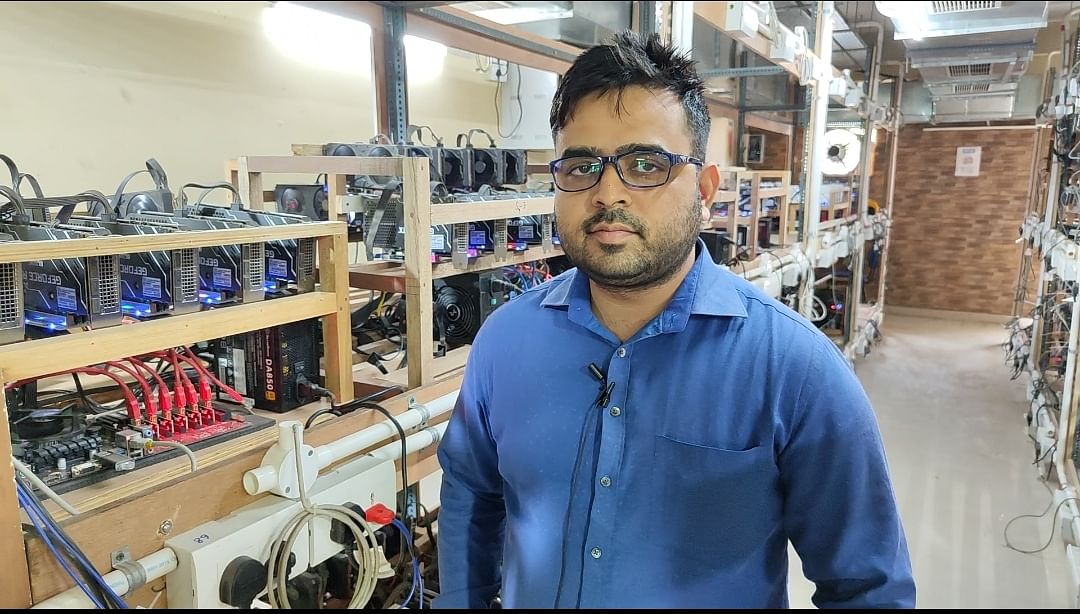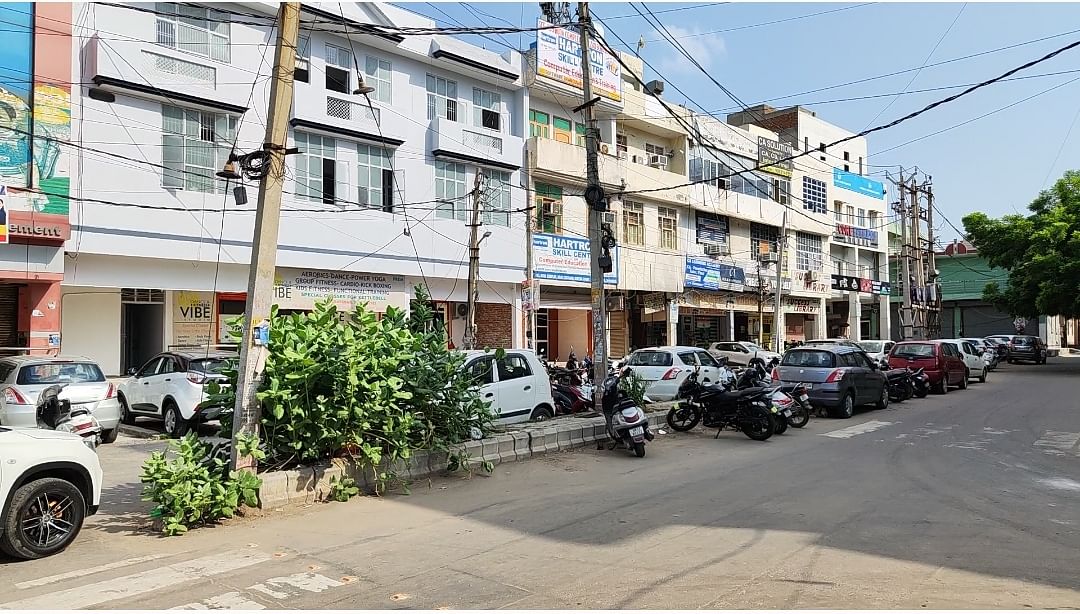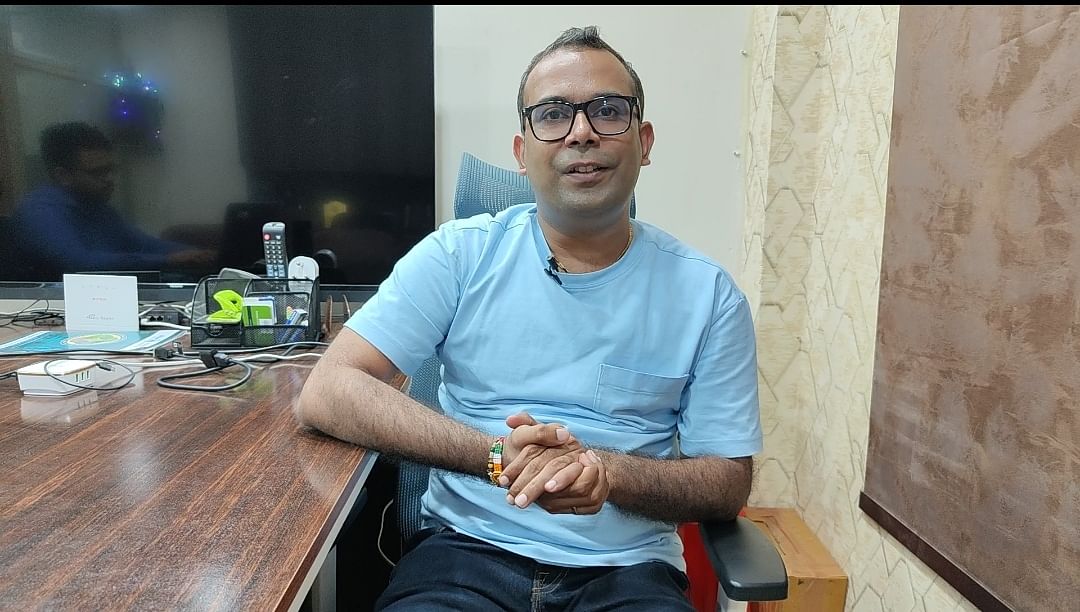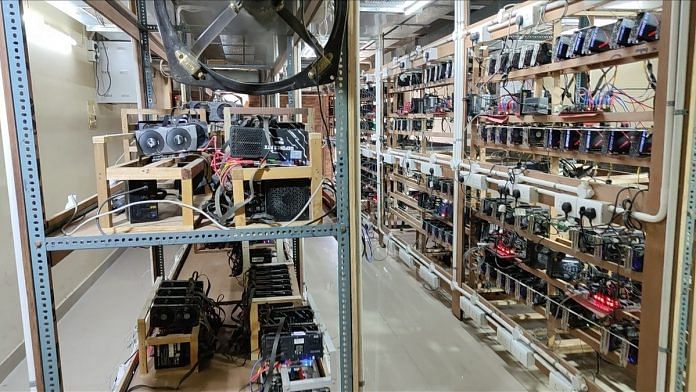An endless whirring of fans and ventilation reverberates through the floor keeping motherboards, graphic cards, PCIe risers and wires from overheating. This server farm located in the middle of a row of dingy coaching centres is Rohtak’s homegrown answer to India’s crypto and blockchain industry.
Tucked away on the upper floors of a standard market complex surrounded by retail stores, and a BSNL exchange branch, New Edge Soft Sol is a slice of the future. It has an indigenously assembled server farm, ready to work with the Haryana government and other state governments on document verification processes, land records and detecting fake products like tampered certificates and counterfeit retail goods.
The setup of contraptions looks like a maze at first, with the motherboards, graphic cards, PCIe risers and wires placed on a line of metallic shelves in a long room. But the work itself, as demonstrated by New Edge’s CEO, Monu Nagar, and engineers, is relatively simple. The farm verifies and validates transactions that take place on the blockchain, while the engineers track the activity on round-the-clock shifts via central monitors.
You wouldn’t know this office exists if you didn’t already have a passing interest in all things distributed ledger technology (DLT) — the startup’s only entrance is a “blink and you’ll miss it” sign on a door, which opens out to a quiet, narrow lane adjacent to a small wedding and religious event space.
This lack of awareness is also evident among the general populace around the complex, which has historically been Rohtak’s “education hub.” Terms like blockchain are seemingly alien to the other establishments’ service workers and the passers-by here, and it all feels somewhat incongruous at first.

Also read: Coinsbit India gets makeover as CryptoForce, strengthens cryptocurrency roots in the country
Foreseen potential growth
Regardless of the level of public education, or lack thereof, New Edge’s founder and managing director, Pardeep Narwal, clearly sees blockchain as the future, ever since the startup pivoted towards DLT during the Covid-19 pandemic.
“We always believe in having three verticals in whatever work we do — service & product, R&D, and education. The blockchain market had been relatively empty and computation hadn’t been scaled up yet, so we saw potential growth from there,” Narwal said, reiterating that the open-source nature of blockchain was a huge selling point for New Edge’s “infrastructure as a service”.
Blockchain itself refers to a peer-to-peer digital decentralised ledger, or financial accounting network, that uses open-source technology to record transactions chronologically in encrypted blocks, thereby forming a secure chain of recorded data.
These transactions may include but are not necessarily limited to cryptocurrencies like Bitcoin, Tether, or Ether. Contrary to popular belief, the catch-all DLT term ‘crypto’ is not synonymous with blockchain, as the former applies to digital currency while the latter refers to a peer-to-peer digital database.
Haryana’s significant step in adopting blockchain
Government policy in India with regard to cryptocurrency and blockchain remains unclear with no framework on the legality of crypto trading. A financial stability board (FSB) report slated for an October release is expected to provide some answers. Aside from a flat 30 percent tax on crypto trade income, which went into effect in April this year, the industry remains largely unregulated.
As far as Narwal and his company are concerned, the government is well aware of the broader blockchain technology and there’s plenty of scope for expanded involvement for New Edge on that front.
In January 2020, the National Informatics Centre under the Ministry of Electronics and Information Technology set up a Centre of Excellence (CoE) in blockchain technology in Bengaluru, Karnataka. The All India Council for Technical Education (AICTE) also offers a free certificate course in blockchain.
“Things have aligned for us in recent months,” Narwal said, referring to Maharashtra’s usage of Polygon Network blockchain startup to issue verifiable caste certificates and partnering with another Indian blockchain startup, LegitDoc, to issue “tamper-proof” diploma certificates amid widespread cases of forgery.

Harnessing an interest in hardware
Amid the ever-changing world of DLT, the one constant for those at New Edge Soft Sol since 2016 has been their long-standing interest in hardware, or what they term “infrastructure as a service”.
The startup first began as an online teaching portal and later offered this hardware infra service to institutions conducting online examinations. But during the pandemic, Narwal said things weren’t exactly working out.
“Our online examination business model and payments depended on erratic exam schedules. So, we sat down and thought about ways to utilise our computers to ensure that they’re working 24×7 and continuously generating revenue. We looked at developing blockchain technology and began providing infrastructure accordingly,” Narwal said.
The company offers its infrastructure “as a service”—a client without the necessary resources or technical skills can keep their server with the New Edge at a server farm that Narwal and his engineers built themselves. They relied on their own education on DLTs over the years, helped by the open-source nature of the technology.
“You don’t need any external help as long as you’ve educated yourself on the subject a little and you have the time to experiment and see what happens. Moreover, there are so many blockchain technologies that it’s not possible for someone to read everything and get external help over specific issues. If anything, it could do more harm than good. Even now whenever we face problems, we solve them on our own, be it an error or a faulty server or a technical fault,” Narwal said.
Educational essentials
For founder Narwal, the journey towards harnessing blockchain technology dates back to his Electronics MTech days studying cryptography and computer networks, although gaining a complete understanding of real-world applications and market values came much later.
As such, the startup stood to benefit from its Rohtak base, its existing knowledge and broader public ignorance, as well as the hardware expertise the engineers had developed over the years. And this education has no end point either — part of New Edge’s more public-facing work is correcting misconceptions.
“I studied for a project management certification from IIM Rohtak and then on blockchain from IIT Kanpur, as well as a coursera course launched by someone from Buffalo, New York. We keep taking these small courses to find out what others know aside from what we already know about blockchain technology…By far, the most common doubt people have is defining blockchain itself. Most visitors have heard of the term, but they don’t know what it actually means. At best, they know that it’s decentralised, which helps us explain better by using analogies like peer-to-peer torrenting,” Narwal added.

Addressing misconceptions
For New Edge specifically, the five men’s main contention is being branded as a crypto firm or as crypto miners and investors, which make up the majority of high-profile Ethereum enthusiasts. Narwal said that too many in the media and the public treat cryptocurrency and blockchain as synonymous.
“People ask me how our company is impacted by the fluctuating prices of crypto but we have nothing to do with cryptocurrency directly, it’s not our business model. We manage servers, whose physical hardware cost remains the same regardless of changes in crypto prices,” Narwal said, adding that recent crypto and non-fungible token (NFT) crashes had little to do with their daily work either.
When demonstrating how the third-floor server farm operates, CEO Nagar singled out his own pet peeve with the term mining, which has caught on in the industry and on social media, particularly in relation to New Edge.
“Traditionally, mining refers to some physical work like coal mining or some form of resource extraction. But there’s no extraction here, it’s just a service we’re providing for some work, such as validating a transaction. This should be called a blockchain validation or verifier or support server farm, but not mining,” Nagar said.
The Ethereum elephant in the room
Amid these misconceptions and misleading characterisations, however, there’s a bigger elephant in the room for New Edge’s server farm for the foreseeable future — The Ethereum Merge.
“Ethereum, introduced in 2015, expanded upon the core concepts of Bitcoin with smart contracts — or computer programs that effectively use the blockchain as a global supercomputer, recording data onto its network…The Merge retires Ethereum’s proof-of-work system, where crypto miners competed to write transactions to its ledger — and earn rewards for doing so — by solving cryptographic puzzles,” explained journalist Sam Kessler of CoinDesk in an article.
In other words, while the New Edge team themselves may not have been involved in direct crypto mining, the Merge means a potential downsising of their client base and, in Narwal’s own words, a hampering and potential closing down of the infrastructure-as-a-service entirely.
“After the Merge, our servers which support Ethereum’s blockchain technology will become redundant. We will take time to find and understand another blockchain to support and it’s possible that if such a profitable blockchain doesn’t yet exist, we will have to close this service and find another industry to offer our hardware services,” Narwal said, outlying three potential scenarios, none of which would pan out anytime soon.
But given their history of pivoting, Narwal and company already have contingencies in mind, as they have been trying to use their technology for tasks like document verification and detecting fake products, and they have credited the Haryana government as a supporter of blockchain technologies, even as finding an effective business model remains an existential hurdle.
“Our work has more scope because the government is very pro-blockchain, thanks to the AICTE course additions which can also materialise into a four-year BTech programme. We are in infrastructure, hardware, and education. We have immersed ourselves in blockchain,” Narwal said.
(Edited by Tarannum Khan)



